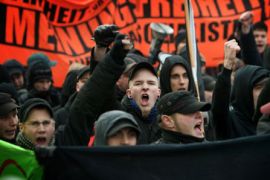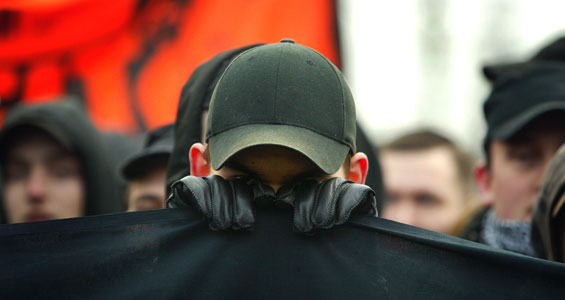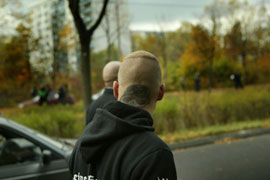Neo-Nazis getting more ‘aggressive’
Anti-racism groups say far right movements are becoming more radicalised and political.

 |
| Official statistics indicate that more German youth are joining neo-Nazi groups |
As a former skinhead who quit the German neo-Nazi movement, Matthias Adrian has an insider’s knowledge of how far right groups operate.
Now working to help other German youth leave neo-Nazi groups, he receives first-hand intelligence on what his former comrades are up to. And he says the news is disturbing.
”I’ve had a feeling for about the last half a year that they were getting more aggressive,” Adrian says.
”There’s a part of the right wing extremist scene that’s had one foot on the gas and the other on the brake and now they think it’s time to loosen the brake.”
A good example of the right wing flexing their muscles was seen in February when a record 6,000 neo-Nazis marched to commemorate the Allied bombing of Dresden during the second world war.
After the march, a gang of neo-Nazis attacked anti-fascist counter-demonstrators at a motorway stop, leaving five injured, including one man with a severe skull fracture.
”They were very aggressive,” says unionist Holger Kindler, who was among the witnesses. ”It was a Nazi crew that was very political not just subcultural. They weren’t satisfied with walking through Dresden.”
“Autonome nationalisten”
The neo-Nazi attack in February was not the work of the typical beer-swilling skinheads but of a group known as ”autonome nationalisten” or free nationalists – a radical, political segment of the far right that is growing in number and, experts fear, poised to create a new wave of violence.
The message from people fighting Nazism – and backed up by a growing stack of statistics – is that far right attitudes are strengthening in Germany, with unpredictable and potentially explosive consequences.
In 2008, the authorities recorded a 30 per cent rise in crimes committed by far right groups. In March, a government-commissioned study revealed that a staggering one in 20 boys aged 15 belonged to a far right organisation – a higher proportion than are involved in mainstream politics.
The worry is that with Germany heading into its worst recession since the second world war, the far right will exploit frustration and anger just as Adolf Hitler used the Great Depression to catapult himself into power.
”Right wing parties will use the financial crisis for propaganda, channelling fury about social and economic injustice into racist and nationalistic attitudes,” says Alexander Haeusler, who studies the far right at Duesseldorf Technical College.
”They are already printing topical pamphlets about the financial crisis.”
Seeking election gains
 |
| Dissent within neo-Nazi groups could spawn more radical elements, experts say |
On the back of this discontent, far right parties will be looking to make gains in Germany’s looming state and federal elections.
Complicating matters, however, is the current self-immolation of the National Democratic Party (NPD), the biggest far right party and for many years the backbone of the movement.
An embezzlement scandal has left the party almost broke with a 2.2 million -euro fine to pay by May 1.
In addition, it has been battered by internal rivalries and ideological rifts that culminated in early April in an unsuccessful challenge to its drab, uncharismatic leader, Udo Voigt, who epitomises the popular impression that the NPD is being led by ineffectual, old men nostalgic for the 1930s.
Observers fear that this upheaval is giving birth to unpredictable, and therefore more dangerous, splinter groups.
In the past, the NPD courted neo-Nazi groups known as ”Kameradschaften” or Brotherhoods, using them as grassroots muscle to win seats in state and local elections.
The NPD, extreme though it is, curbed the most violent impulses of the Brotherhoods because violence turned away voters.
Rise of the nationalists
But many of these Brotherhoods have become disillusioned with democratic politics and are splitting away, experts say. Hence the rise of the ”free nationalists” such as those who attacked their opponents after the Dresden march.
”They have no organisation behind them so they can do whatever they want without responsibilities,” says Matthias Adrian. ”All those people who want to be violent … that’s now their playground.”
The alternative danger, observers warn, is that the shakeup in the far right will produce a reinvigorated movement with fresh faces and savvy minds at the top.
”At the moment, the NPD is its own worst enemy,” says Stephen Kramer, the head of the Central Council of Jews in Germany.
”But if they get a smart leader, someone like [the late Austrian far right leader] Joerg Haider, then we’re in real trouble.”